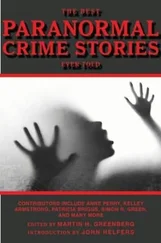This collection of authors represents that same philosophy of writing what you want to write and writing it well. Some of them have done that, died, and achieved a modicum of immortality. The rest of them remain earthbound, still writing, and waiting to see how time will deal with them. All of them share in common a desire to explore mankind in a moment on the edge. The edge equates to the crime committed. How the characters deal with the edge is the story.
A Jury of Her Peers
SUSAN GLASPELL
Susan Keating Glaspell (1876–1948) was born in Davenport, Iowa, attended Drake University and the University of Chicago, and worked as a journalist before turning to full-time fiction-writing in 1901. Her first novel, The Glory of the Conquered , appeared in 1909 and her first story collection, Lifted Masks , in 1912, but she would achieve her greatest fame as a playwright, culminating in a controversial Pulitzer Prize for Alison’s House (1930), inspired by the life of Emily Dickinson. From 1914 to 1921, she was a member of the Provincetown Players, a bohemian theatre-based community founded by her idealist husband George Cram Cook. Among the other members were Edna St. Vincent Millay, Djuna Barnes, Edna Ferber, John Reed, and the writer who would become the greatest American playwright of the time, Eugene O’Neill.
After early stories that were popular romances of the local-color school, Glaspell was influenced to adopt a more naturalistic approach, along with socialist political attitudes, by her husband and Floyd Dell. The rebellion of women against the domination of simple-minded males was a continuing subject. One of her plays, the one-act Trifles (1916), became the basis for her most famous story, “A Jury of Her Peers” (1917). There’s no denying this is a detective story — indeed, in the fashion of the time, one in which amateur sleuths are more perceptive than professionals — but it is a highly unconventional, one-of-a-kind detective story in which the detection is used to make a serious thematic point.
When Martha Hale opened the storm-door and got a cut of the north wind, she ran back for her big woolen scarf. As she hurriedly wound that round her head her eye made a scandalized sweep of her kitchen. It was no ordinary thing that called her away — it was probably further from ordinary than anything that had ever happened in Dickson County. But what her eye took in was that her kitchen was in no shape for leaving: her bread all ready for mixing, half the flour sifted and half unsifted.
She hated to see things half done; but she had been at that when the team from town stopped to get Mr. Hale, and then the sheriff came running in to say his wife wished Mrs. Hale would come too — adding, with a grin, that he guessed she was getting scary and wanted another woman along. So she had dropped everything right where it was.
“Martha!” now came her husband’s impatient voice. “Don’t keep folks waiting out here in the cold.”
She again opened the storm-door, and this time joined the three men and the one woman waiting for her in the big two-seated buggy.
After she had the robes tucked around her she took another look at the woman who sat beside her on the back seat. She had met Mrs.
Peters the year before at the county fair, and the thing she remembered about her was that she didn’t seem like a sheriff’s wife.
She was small and thin and didn’t have a strong voice. Mrs. Gorman, sheriff’s wife before Gorman went out and Peters came in, had a voice that somehow seemed to be backing up the law with every word. But if Mrs. Peters didn’t look like a sheriff’s wife, Peters made it up in looking like a sheriff. He was to a dot the kind of man who could get himself elected sheriff — a heavy man with a big voice, who was particularly genial with the law-abiding, as if to make it plain that he knew the difference between criminals and non-criminals. And right there it came into Mrs. Hale’s mind with a stab, that this man who was so pleasant and lively with all of them was going to the Wrights’ now as a sheriff.
“The country’s not very pleasant this time of year,” Mrs. Peters at last ventured, as if she felt they ought to be talking as well as the men.
Mrs. Hale scarcely finished her reply, for they had gone up a little hill and could see the Wright place now, and seeing it did not make her feel like talking. It looked very lonesome this cold March morning. It had always been a lonesome-looking place. It was down in a hollow, and the poplar trees around it were lonesome-looking trees. The men were looking at it and talking about what had happened. The county attorney was bending to one side of the buggy, and kept looking steadily at the place as they drew up to it.
“I’m glad you came with me,” Mrs. Peters said nervously, as the two women were about to follow the men in through the kitchen door.
Even after she had her foot on the doorstep, her hand on the knob, Martha Hale had a moment of feeling she could not cross the threshold. And the reason it seemed she couldn’t cross it now was simply because she hadn’t crossed it before. Time and time again it had been in her mind, “I ought to go over and see Minnie Foster”—she still thought of her as Minnie Foster, though for twenty years she had been Mrs. Wright. And then there was always something to do and Minnie Foster would go from her mind. But now she could come.
The men went over to the stove. The women stood close together by the door. Young Henderson, the county attorney, turned around and said, “Come up to the fire, ladies.”
Mrs. Peters took a step forward, then stopped. “I’m not — cold,” she said.
And so the two women stood by the door, at first not even so much as looking around the kitchen.
The men talked for a minute about what a good thing it was the sheriff had sent his deputy out that morning to make a fire for them, and then Sheriff Peters stepped back from the stove, unbuttoned his outer coat, and leaned his hands on the kitchen table in a way that seemed to mark the beginning of official business. “Now, Mr. Hale,”
he said in a sort of semi-official voice, “before we move things about, you tell Mr. Henderson just what it was you saw when you came here yesterday morning.”
The county attorney was looking around the kitchen.
“By the way,” he said, “has anything been moved?” He turned to the sheriff. “Are things just as you left them yesterday?”
Peters looked from cupboard to sink; from that to a small worn rocker a little to one side of the kitchen table.
“It’s just the same.”
“Somebody should have been left here yesterday,” said the county attorney.
“Oh — yesterday,” returned the sheriff, with a little gesture as of yesterday having been more than he could bear to think of. “When I had to send Frank to Morris Center for that man who went crazy — let me tell you, I had my hands full yesterday . I knew you could get back from Omaha by today, George, and as long as I went over everything here myself—”
“Well, Mr. Hale,” said the county attorney, in a way of letting what was past and gone go, “tell just what happened when you came here yesterday morning.”
Mrs. Hale, still leaning against the door, had that sinking feeling of the mother whose child is about to speak a piece. Lewis often wandered along and got things mixed up in a story. She hoped he would tell this straight and plain, and not say unnecessary things that would just make things harder for Minnie Foster. He didn’t begin at once, and she noticed that he looked queer — as if standing in that kitchen and having to tell what he had seen there yesterday morning made him almost sick.
Читать дальше












